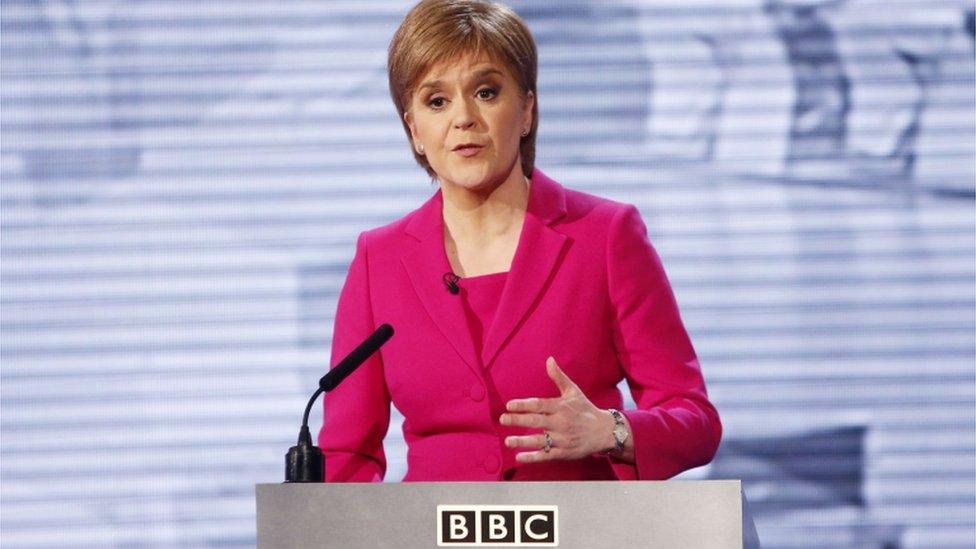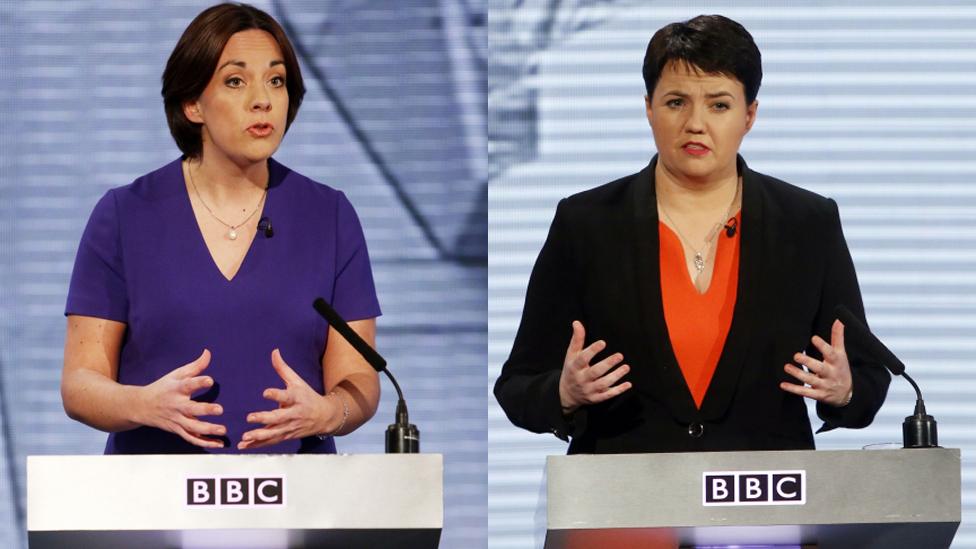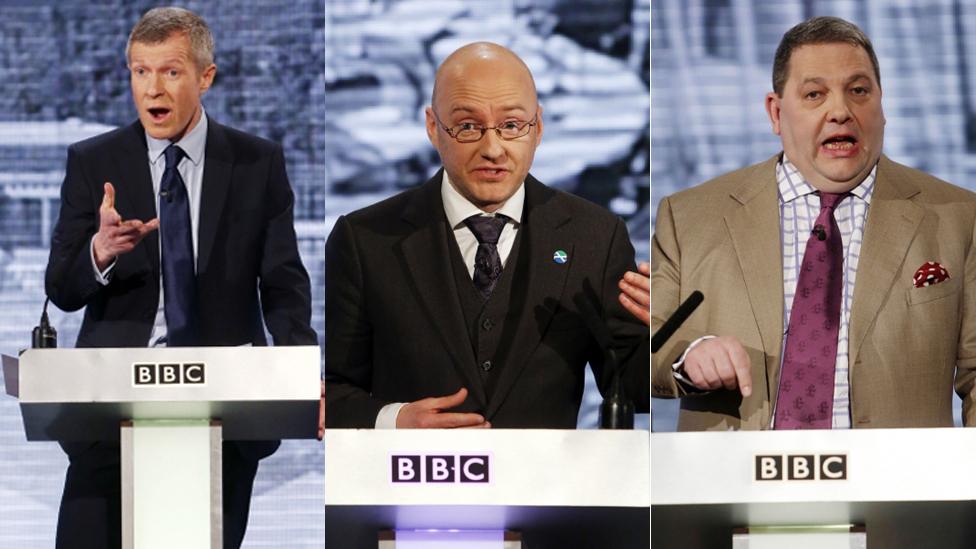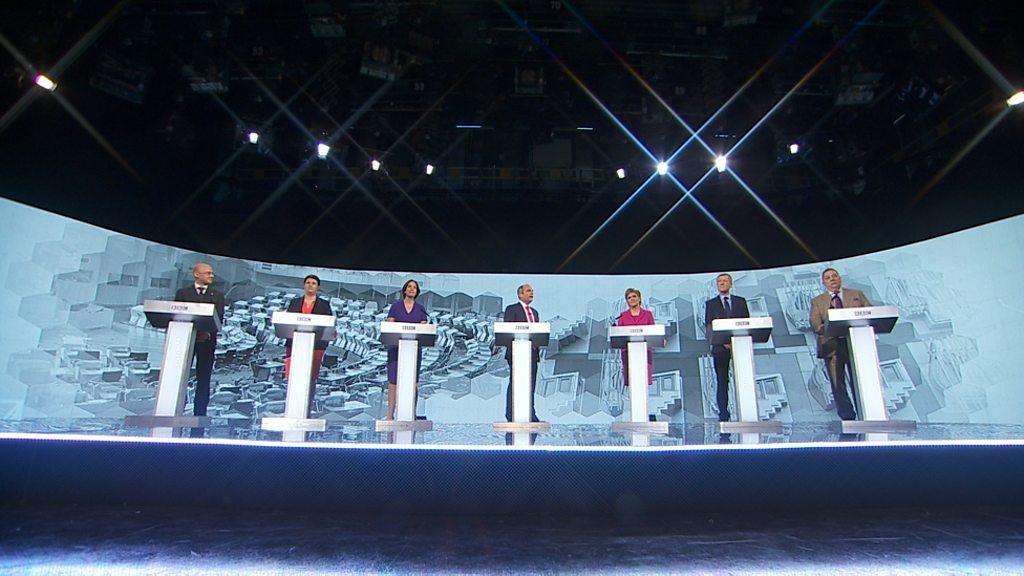Holyrood election: Nicola Sturgeon 'still wants' 50p income tax rate
- Published
Leaders of the main political parties in Scotland clashed over taxation
Nicola Sturgeon has reiterated that she wants to eventually see a 50p top rate of income tax in Scotland.
The SNP leader was speaking as the leaders of Scotland's six largest parties clashed in a BBC Scotland debate ahead of the Holyrood election.
Scottish Labour's Kezia Dugdale questioned why Ms Sturgeon had ruled out introducing a 50p rate next year.
But Ruth Davidson of the Conservatives warned against making Scotland the highest taxed part of the UK.
The panel also featured Willie Rennie of the Scottish Liberal Democrats, who spelled out his plans for pay for a "transformation" of education by raising all income tax bands by 1p - a policy his party shares with Scottish Labour.
Patrick Harvie of the Scottish Greens called for the "outdated" council tax to be scrapped, while UKIP MEP David Coburn warned against "frightening people away" from Scotland by raising taxes.
The debate, which was broadcast on BBC1 Scotland on Thursday evening, was held as the election campaign officially began ahead of the vote on 5 May.
It was largely dominated by the key question of how best to use the Scottish Parliament's new powers over tax and welfare.
The parliament will have the ability to set income tax rates and bands from 1 April next year, making the issue key in the run-up to the election.

Opinion polls have suggested Ms Sturgeon's SNP is on course for a third consecutive term in government at Holyrood
Scottish Labour has challenged the SNP to raise the income tax rate for the 17,000 people in Scotland earning more than £150,000 from 45p to 50p - higher than elsewhere in the UK.
But speaking in the Scottish Parliament on Wednesday, Ms Sturgeon said it would be "reckless" and "daft" to do so straight away.
During the BBC Scotland debate, Ms Sturgeon again pointed to civil service analysis which suggested the move could actually leave Scotland £30m worse off.
'Less money'
That was because some high earners would either move their money out of Scotland or find other ways of avoiding paying the tax.
Ms Sturgeon, whose party will be looking to win a third consecutive term in government, told the studio audience she would attempt to find ways to mitigate that risk if she was re-elected as first minister.
She added: "I think there should be a 50p top rate of tax, but you don't set tax rates if it is going to lose you money.
"I don't want to turn around in two years time and say we have less money to spend on our health service".

Scottish Labour's Kezia Dugdale has called for a 50p top rate of tax - but Ruth Davidson's Conservatives do not want taxes to be higher in Scotland than elsewhere in the UK
Ms Sturgeon said her party would not follow UK Chancellor George Osborne in raising the level at which people pay the 40p rate of tax from £43,000 to £45,000.
And she said she was asking the 10% of highest earners to "shoulder a bit more of the burden" in order to invest in areas such as the health service, and to "protect against Tory austerity".
'Great crusader'
Ms Dugdale responded by saying Scottish Labour wanted to put up taxes to increase investment in education in order to bring more high skilled jobs to Scotland.
She added: "What I cannot believe is that Nicola Sturgeon, who has made her name as this great socialist, this great crusader against austerity, is standing here tonight making an excuse that she won't introduce the 50p tax rate because rich people might avoid paying it."
Labour also wants to put 1p on the basic rate of income tax in Scotland, with Ms Dugdale arguing: "If we did that we could raise enough money to stop the cuts, make different choices from the Tories."

Willie Rennie (left) and Patrick Harvie (centre) said tax rises were necessary to invest in the future, but David Coburn (right) warned of the risk of scaring people away from Scotland
Ms Davidson, the Scottish Conservative leader, said: "The people at home have just watched the first minister of Scotland saying she wants to make Scotland the highest taxed part of the UK.
"And then they have watched the leader of the opposition say that's not enough, we need to take more money off working Scots.
"Hanging a sign at the border that says 'higher taxes here' encourages neither the growth, the investment or the jobs that we need to properly fund our public services."
But Mr Rennie, the leader of the Scottish Liberal Democrats, accused Ms Davidson of "wanting to give a tax cut to the wealthiest in society."
'Transformational investment'
He said: "I want to make a transformational investment in education. Scottish education used to be one of the best in the world.
"Now it is slipping down the rankings. We need to invest £475m in education, for nurseries, for schools and for colleges to get Scottish education racing back up the international league tables."
Mr Harvie, the co-convenor of the Scottish Greens, turned the focus of the debate to local taxes when he declared: "We have to be ready to scrap the council tax", which he argued was 25 years out of date.
And Mr Coburn, an MEP who is UKIP's only elected representative in Scotland, said higher taxes in Scotland would discourage people from investing in businesses and creating jobs.
The leaders of the main political parties in Scotland elaborate on how they would handle a phone call from US presidential hopeful Donald Trump

BBC Scotland's election coverage
Second leaders' debate - It will take place on Sunday, 1 May, at a venue yet to be finalised in front of an audience of voters. The host will be Scotland editor Sarah Smith. She will put questions to Nicola Sturgeon (SNP); Kezia Dugdale (Scottish Labour); Ruth Davidson (Scottish Conservatives); Willie Rennie (Scottish Lib Dems) and Patrick Harvie (Scottish Greens).
BBC poll - The results of a specially-commissioned survey will be published during the campaign. It will focus on the issues that matter to the electorate.
Radio interviews - Good Morning Scotland's Gary Robertson will quiz each of the party leaders during the campaigning period. The politicians will also be answering the questions of listeners when they appear on the Kaye Adams programme. In addition, Good Morning Scotland will be touring the country to find out what matters locally.
Reporting Scotland - The weeknight programme will be extended to an hour from Monday 25 April, to cover the later stages of the election campaign.
Scotland 2016 - The late night BBC Two show will host a series of issue-based debates.
Sunday Politics - Broadcaster Gordon Brewer will explore with leaders the main talking points that emerge during the campaign.
Local debates - Radio Scotland will host a number of constituency debates in Shetland, Orkney, Aberdeenshire, Inverness, Dumfries, and Selkirk.
BBC Scotland news website - It will be the key destination for interviews, features and breaking news stories throughout the campaign. There will also be shareable content on social media that will engage and educate the audience.
The Big Debate with Gordon Brewer - will be holding a series of Scottish election specials around Scotland.
BBC Alba - There will be election coverage in An Taghadh on 3 April. Further detail will feature in Radio Nan Gaidheal's news and current affairs programming, and on its online service.
Election night - Extensive coverage will take place across TV, radio and online.
- Published24 March 2016
